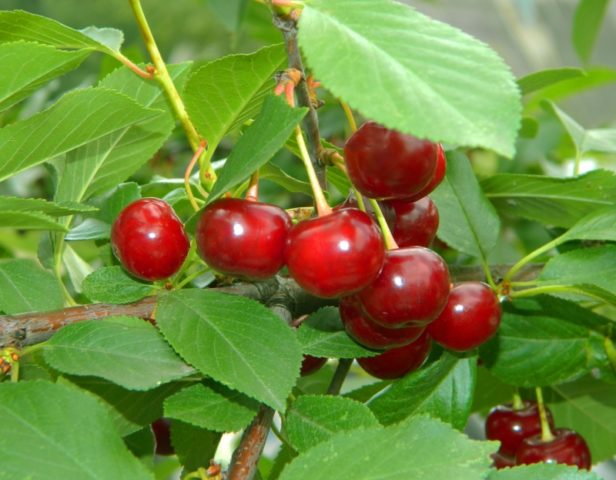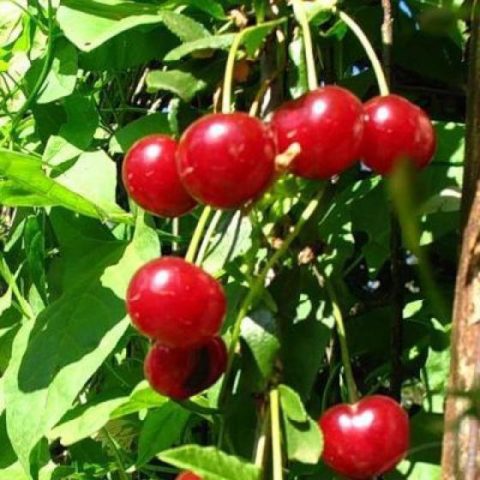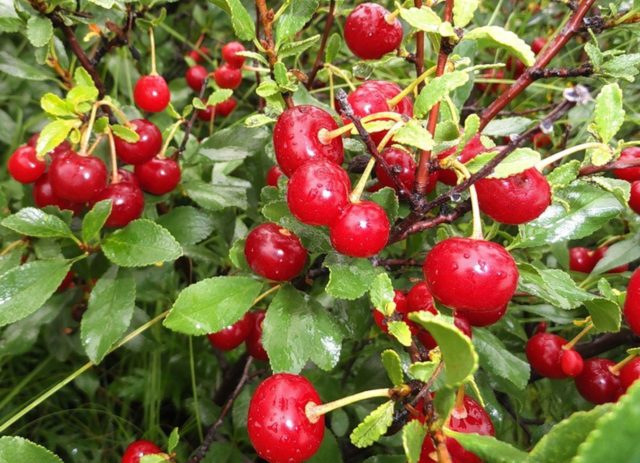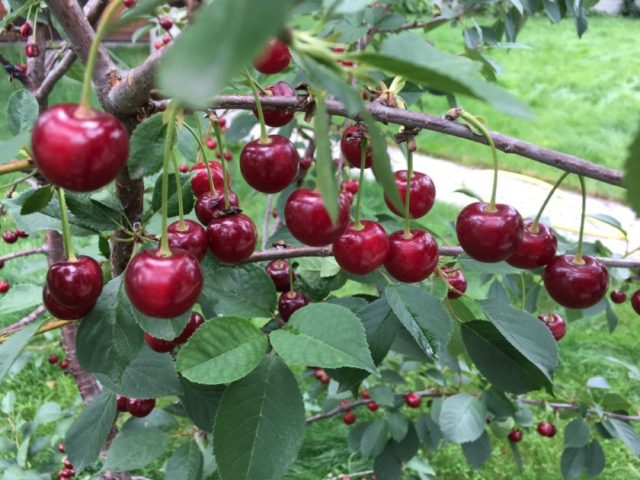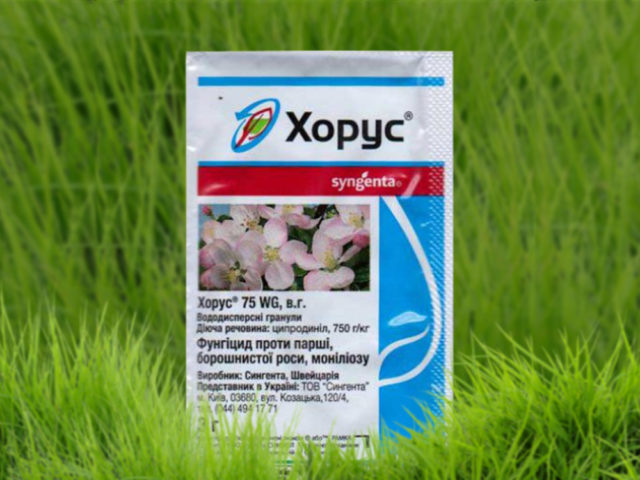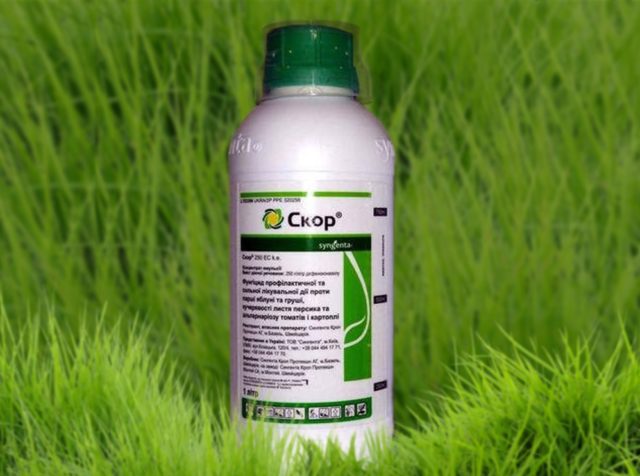Content
Cherry Zhelannaya is a shrub variety of culture. It was bred by Altai scientists G.I.Subbotin and I.P. Kalinina in 1966 by crossing a selected seedling obtained from steppe and common cherries and the Griot Ostgeimsky variety. It was entered into the State Register of Breeding Achievements in 1990. The variety is distinguished by its universal purpose, resistance to drought and frost.
Description of the variety of steppe cherry Zhelannaya
Cherry Zhelannaya grows in bush form. The crown forms a rounded, wide, raised one. The branches of an adult tree are numerous, the density of the bush is average. The bark is smooth brown with a gray bloom, small grayish-white lenticels. The internodes are short. The kidneys are cone-shaped.
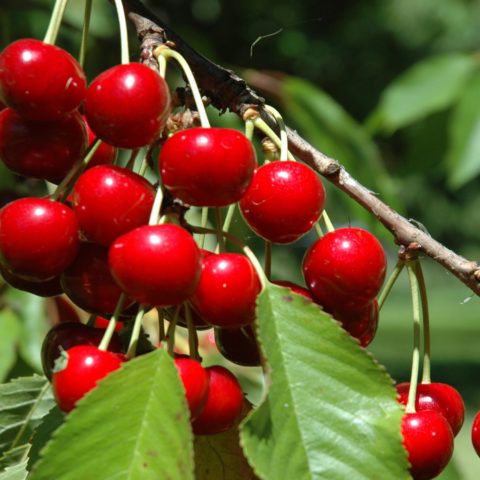
Cherry varieties Zhelannaya are distinguished by their scarlet color and the same fruit size
The leaves of the variety are smooth, light green. The size of the leaf plate is average, the shape is elongated with a pointed top. The flowers are pink, about 20-25 cm in diameter, white, collected in inflorescences of 2-6 pcs. The buds are light pink.
Cherry Zhelannaya is widely zoned, suitable, among other things, for cultivation in the West Siberian region.
Height and dimensions of an adult tree
The adult culture forms a medium-sized bush. It reaches a height of 1.7 m, the crown density is low. The thickness of the shoots is average, after regrowth they sag. According to the photo, description and reviews, the Zhelannaya cherry forms a small amount of basal growth.
Description of fruits
Cherry fruits Desirable one-dimensional, weighing 3.5-4 g. Rounded in shape with a slight flattening. The stone weighs about 0.16 g and separates well from the pulp. The skin is scarlet or red of medium thickness and density.
The fruits contain:
- 13.0-16.0% dry soluble substances;
- up to 10.6% sugars;
- up to 1.4% acids;
- up to 20.0 mg of vitamin C;
- 150.0-165.0 mg of P-active substances;
- 0.26% tanning compounds.
Cherry Zhelannaya has a pleasant sweet and sour taste. The pulp is pink-red juicy. The purpose of the variety is universal.
Fruit tasting:
- 4.5 points fresh,
- 4.1 points in the form of jam;
- 4.3 points in compote.
The berries are well attached to the stalk, so they are less prone to shedding when ripe.
Cherry pollinators Zhelannaya
Cherry Desirable is partially self-fertile. To increase yields, it needs trees or shrubs-pollinators.
The best cherry varieties for pollination:
- Altai Swallow;
- Selivertovskaya;
- Subbotinskaya;
- Maximovskaya.
It is most favorable to plant trees in groups of 3-5 pcs. Cherry variety Zhelannaya has a medium late flowering period, which occurs in late spring - early summer.
Main characteristics
Zhelannaya steppe cherry is a fruit crop with an early ripening period. It is attractive for cultivation due to its high yield and good taste of the fruit.
Drought resistance, frost resistance
Cherry varieties Zhelannaya bred specifically for cultivation in the climate of Siberia and is one of the most winter-hardy species. Withstands frosts down to -25 ° C. In more severe winters, freezing of the tops of annual shoots and flower buds is possible.
The crop has good resistance to damping off branches and root collars under snow cover. Therefore, it is recommended to bend the branches and cover them with snow. Cherry Zhelannaya also has a high drought tolerance.
Yield
The yield of the variety is high, given the compactness of the bush. The average declared volume is 6.7 kg per bush. Under favorable growing conditions, the maximum amount of cherries can reach up to 12 kg per plant. The productivity of the culture is long-term, active fruiting occurs for several decades.
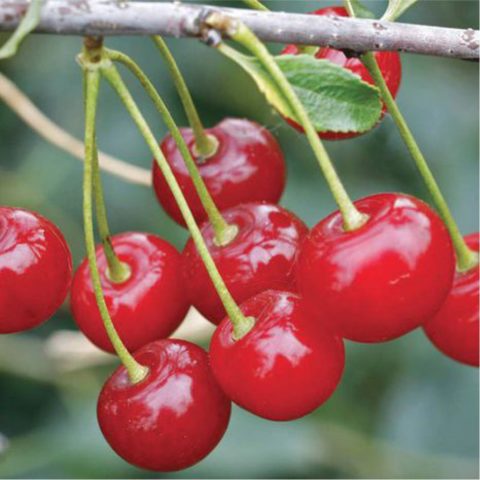
Cherries of the Zhelannaya variety are well attached to the stalk
The early maturity of the variety is average. The first crop is obtained in the third year after planting. The flowering and fruiting period is medium late. Shoot growth ends in early July, fruits ripen in mid-summer.
To increase yields, bushes are planted in groups, including using other varieties. At the same time, planting is not recommended to thicken, so that each shrub has a sufficient nutritional area.
Zhelannaya cherries are suitable both for fresh consumption and for various preparations. The berries are of average transportability. Fresh fruits must be stored at room conditions for one week, in the refrigerator - up to 10 days.
Advantages and disadvantages
Cherry Zhelannaya has long-term productivity and is suitable for growing in various climatic zones. According to reviews about the steppe cherry Zhelannaya, it is distinguished by large fruits with a small stone.
Other advantages of the variety:
- yield;
- pleasant fruit taste;
- universal purpose;
- relative frost resistance;
- drought resistance;
- partial self-fertility.
The disadvantages include the instability of the variety to a fungal disease - coccomycosis. And also low transportability due to the thin skin and juiciness of berries. Bush cherries are smaller than tree cherries and have a significant sour taste.
Landing rules
For planting steppe cherries of the Zhelannaya variety, a sufficient area of a fertile site is required. It is most favorable to plant bushes in high places without stagnation of melt and rainwater. The acidity of the soil should be close to neutral.
Recommended timing
Spring or autumn is suitable for planting. Spring planting is preferable immediately after the snow melts. In this case, the landing pit must be prepared in advance.
Site selection and soil preparation
Plants are planted in a place protected from cold winds. The distance between the bushes is about 3 m. The soil in the growing area must be permeable and light. For this, depleted and heavy soils are improved in a separate planting pit or trench.
How to plant correctly
The seedling is recommended to be lowered into the planting hole on a constructed earthen roller and sprinkled with a fertile layer of soil. The root collar is not buried, leaving it 3-5 cm above the general soil level. After planting, the soil is tamped along the near-trunk circle, watered abundantly.
Rules for growing steppe cherries Zhelannaya
For a favorable cultivation of crops, weeding, shallow loosening of the soil are necessary.
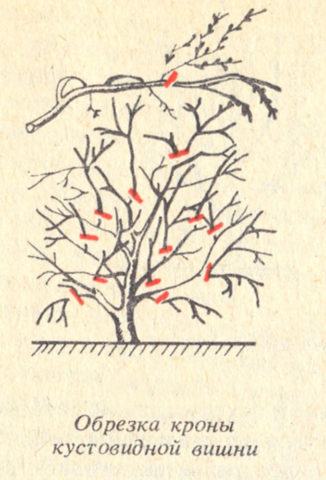
Correct pruning of cherries can increase the yield
The agricultural technique of culture also includes periodic watering, top dressing and thinning pruning of shoots.
Watering and feeding schedule
For additional watering of cherry bushes, the drip method is most suitable, in which less fungal infections occur. Depending on natural conditions, up to four additional heavy waterings may be required. Particularly important periods are flowering and the beginning of fruiting.
After planting in a well-filled hole, the next top dressing is applied in the year of the first fruiting.Fertilizers are used at the rate of: 100 g of superphosphate and 1-2 kg of ash under one bush. The components are applied along its perimeter at the end of summer after picking berries. Compost is added in early spring or late autumn. Once every 5-6 years, the soil under the bushes is deoxidized with dolomite flour.
Pruning
Pruning is carried out in April on dormant buds. It consists in forming a crown and removing damaged shoots. Thickening branches are also cut out so that all fruits have enough light. An indicator of the correct development of the culture is the annual growth of shoots of 30-40 cm. Excessive, as well as insignificant growth of branches has a bad effect on the yield and winter hardiness of the culture.
Preparing for winter
The shoots of the bush cherry shape Zhelannaya are flexible, which allows them to be freely bent and covered in preparation for the winter period. Unprotected branches, like fruit buds, can be significantly damaged during severe winters.
Diseases and pests
Cherry Desirable is susceptible to fungal diseases that can significantly damage the crop. The variety is especially unstable to coccomycosis. To prevent the occurrence of infections, spraying with Bordeaux liquid, as well as Horus and Skor preparations, is used.
They use insecticide spraying against pests together.
Conclusion
Cherry Zhelannaya is a perennial undersized shrub with falling branches. Bred from drought and frost resistant varieties. It has a high yield and pleasant fruit taste, which makes it attractive for further breeding.
